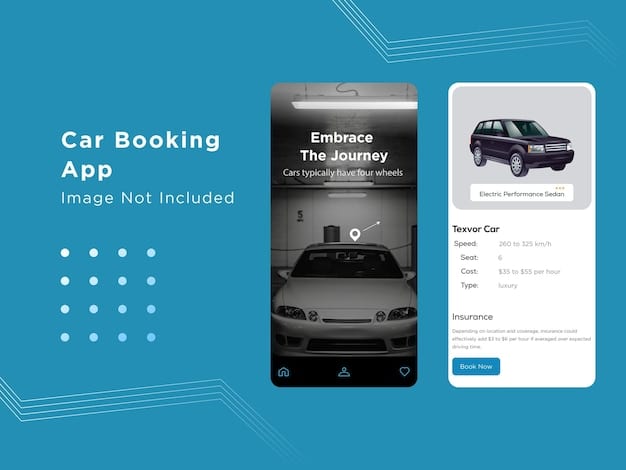Earn Passive Income: Rent Your Car on Turo in the US

Earning passive income by renting out your car on Turo in the US market involves listing your vehicle on the platform, setting prices and availability, and allowing vetted renters to use your car, while you earn money without actively driving.
Looking for ways to generate passive income? Your car, often sitting idle, could be a valuable asset. Discover how you can earn passive income from your car: renting out your vehicle on Turo in the US market and transforming it into a money-making machine.
Unlock Passive Income: Turo Car Rental in the US
Turo has emerged as a popular platform connecting car owners with renters, offering a unique opportunity to generate passive income. For car owners in the US, Turo provides a straightforward way to leverage their existing assets.
This section explores the benefits and nuances of utilizing Turo to transform your car into a revenue-generating asset.
What is Turo and How Does it Work?
Turo is a peer-to-peer car sharing marketplace where individuals can rent out their vehicles to other users. It functions similar to Airbnb, but for cars.
The platform handles the booking process, insurance, and driver verification, providing a secure and reliable environment for both owners and renters.
Benefits of Renting Your Car on Turo
Renting your car on Turo offers several advantages, making it an appealing option for those seeking passive income.
- Passive Income Generation: Earn money while your car would otherwise be sitting unused.
- Flexibility: Set your own prices, availability, and rules for renters.
- Insurance Coverage: Turo provides liability insurance coverage during the rental period.
- Easy Listing Process: Creating a listing is straightforward, allowing you to start quickly.

Turo provides a compelling solution for individuals eager to earn passive income without significant additional effort. The flexibility and support offered by the platform make car rental an attractive option.
Getting Started: Listing Your Car on Turo
The first step to earning passive income on Turo is to create a listing for your car. This process involves providing detailed information about your vehicle and setting your rental terms.
Optimizing your listing can significantly impact your car’s visibility and attractiveness to potential renters.
Essential Information for Your Listing
When creating your listing, be thorough and accurate to attract reliable renters and ensure a smooth rental experience.
- Vehicle Details: Include the make, model, year, and trim of your car.
- Photos: Upload high-quality photos showcasing your car’s interior and exterior.
- Description: Write a compelling description highlighting the unique features and benefits of renting your car.
- Pricing: Set competitive rental rates based on your car’s value and local market conditions.
Setting Your Rental Terms
Defining your rental terms is crucial to protect your vehicle and ensure renters respect your property.
Consider the following aspects when setting your terms:
- Mileage Limits: Specify the maximum mileage allowed per rental to prevent excessive wear and tear.
- Delivery Options: Decide whether to offer delivery to convenient locations for renters.
- Pet and Smoking Policies: Clearly state your preferences regarding pets and smoking in the car.
- Cancellation Policy: Outline the cancellation terms to protect your income if a renter cancels at short notice.
By providing comprehensive information and setting clear, reasonable rental terms, you’ll attract responsible renters and maximize your earnings potential on Turo.

Maximizing Your Earnings on Turo
To maximize your passive income on Turo, it’s essential to implement effective pricing strategies and maintain a high level of customer satisfaction. Strategic management can significantly increase your occupancy rate and overall earnings.
This involves optimizing your listing based on market trends and providing exceptional service to renters.
Pricing Strategies for Success
Setting the right price is critical to attracting renters while maximizing your earning potential. Consider dynamic pricing strategies that adapt to demand and seasonality.
You could implement:
- Seasonal Pricing: Adjust your rates based on peak travel seasons or local events.
- Weekend Rates: Charge higher rates for weekend rentals, when demand is typically higher.
- Discounts for Longer Rentals: Offer discounts for rentals longer than a few days to encourage extended bookings.
Providing Excellent Customer Service
Exceptional customer service is key to earning positive reviews and repeat business on Turo. Prompt responses and helpful assistance can set you apart from other listers.
You can ensure renter satisfaction through:
- Prompt Communication: Respond quickly to renter inquiries and booking requests.
- Clean and Well-Maintained Vehicles: Ensure your car is clean, tidy, and in good working condition.
- Clear Instructions: Provide clear instructions for pickup, drop-off, and any rules or restrictions.
Balancing dynamic pricing with excellent customer service is key to maximizing your earnings and building a successful car rental business on Turo.
Understanding Turo’s Insurance and Protection
One of the key considerations when renting out your car on Turo is understanding the insurance coverage and protection provided by the platform. Turo offers various protection plans to safeguard car owners against potential damages or liabilities.
A clear understanding of these options ensures you’re adequately protected while earning passive income.
Overview of Turo’s Protection Plans
Turo provides several protection plans, each offering different levels of coverage and deductibles. Car owners can choose the plan that best suits their needs and risk tolerance.
These plans generally cover:
- Liability Insurance: Provides coverage for damages or injuries caused to third parties.
- Physical Damage Protection: Covers damages to your vehicle during the rental period.
- Theft Protection: Protects against theft of your vehicle.
Key Considerations for Choosing a Plan
When selecting a protection plan, consider factors such as the value of your car, your risk tolerance, and the potential costs of repairs or liabilities.
Evaluate the following criteria:
- Deductible Amount: Determine how much you’re willing to pay out-of-pocket in case of damage.
- Coverage Limits: Ensure the plan covers potential repair costs and liability claims.
- Restrictions and Exclusions: Understand any limitations or exclusions in the coverage.
By carefully considering Turo’s protection plans and selecting the one that best aligns with your needs, you can confidently rent out your car, knowing you’re adequately protected.
Navigating Legal and Tax Implications
Renting out your car on Turo involves understanding the legal and tax implications of generating income through a car sharing platform. Staying compliant with local regulations and properly reporting your earnings is crucial for long-term success.
This section provides insights into navigating these aspects effectively.
Compliance with Local Regulations
Before listing your car on Turo, familiarize yourself with local regulations and requirements related to car sharing and rental services. Some jurisdictions may have specific licensing or permitting requirements.
Tax Reporting and Deductions
Income earned through Turo is generally considered taxable income and must be reported to the IRS. However, you may also be eligible for certain deductions to offset your tax liability.
- Tracking Income and Expenses: Maintain records of all rental income and expenses related to your Turo business.
- Deductible Expenses: Common deductions include car maintenance, insurance, cleaning, and Turo fees.
- Depreciation: Claim depreciation on your vehicle based on its business use.
Understanding and adhering to legal and tax obligations is crucial for maintaining a compliant and profitable Turo car rental venture.
Common Challenges and How to Overcome Them
While renting out your car on Turo can be a great way to earn passive income, you may encounter some common challenges along the way. Addressing these challenges proactively can enhance your experience and maximize your earnings.
This section outlines some typical issues and provides strategies for overcoming them.
Dealing with Difficult Renters
Occasionally, you may encounter renters who are difficult to deal with, whether due to communication issues, damage to the car, or disputes over fees.
Mitigation techniques include:
- Screening Renters: Review renter profiles and ratings before accepting booking requests.
- Clear Communication: Set clear expectations and rules at the beginning of the rental period.
- Documentation: Document the car’s condition before and after each rental with photos and videos.
Managing Maintenance and Repairs
Regular maintenance and occasional repairs are inevitable when renting out your car frequently. Proper maintenance keeps your vehicle reliable and attractive to renters.
Ensure you have:
- Scheduled Maintenance: Follow the manufacturer’s recommended maintenance schedule.
- Prompt Repairs: Address any mechanical issues or damages promptly to prevent further problems.
- Emergency Fund: Set aside funds to cover unexpected repairs or maintenance costs.
By preparing for and addressing common challenges proactively, you can enjoy a smoother and more profitable car rental experience on Turo.
| Key Point | Brief Description |
|---|---|
| 🚗 Passive Income | Rent out your car on Turo to earn money without actively driving. |
| 🛡️ Insurance | Turo provides various protection plans for car owners. |
| 💰 Maximizing Earnings | Set competitive prices and provide excellent customer service. |
| ⚖️ Legal & Tax | Comply with local regulations and report income accurately. |
Frequently Asked Questions (FAQ)
▼
Turo uses a combination of factors, including your car’s market value, location, time of year, and demand, to suggest a rental price. You can also adjust this price to suit your needs.
▼
Turo provides insurance coverage for damages during the rental period. You will need to file a claim, and Turo will handle the repair process, subject to the deductible of your chosen protection plan.
▼
While you can’t specifically choose renters, Turo verifies each renter’s driving record and identity. You can also set preferences, such as requiring renters to have a certain minimum age.
▼
You can arrange for renters to pick up the car at your location or offer delivery to a convenient location. Ensure you clearly communicate the process and any specific instructions to the renter.
▼
Turo charges a commission fee on each rental, which is deducted from your earnings. The fee varies depending on the protection plan you choose, but it typically ranges from 20% to 35% of the rental price.
Conclusion
Renting out your car on Turo in the US market offers a viable pathway to earn passive income from your car: renting out your vehicle on Turo in the US market. By understanding the platform’s nuances, implementing effective strategies, and staying compliant with regulations, you can transform your car into a valuable asset.





